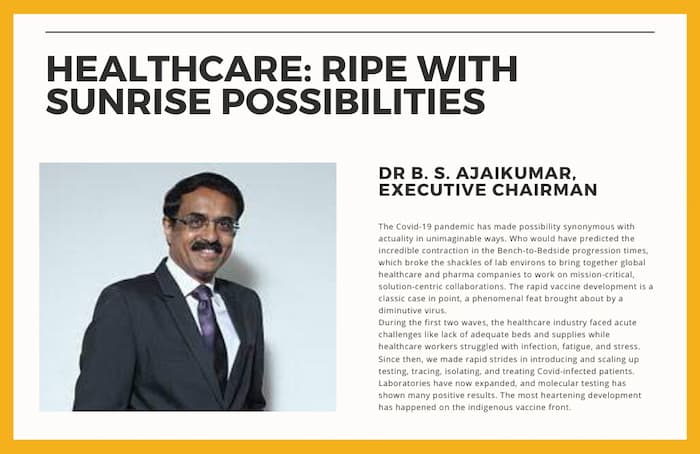
Healthcare: Ripe with sunrise possibilities
Year end thoughts by Dr B. S. Ajaikumar, Executive Chairman, HealthCare Global Enterprises Ltd
The Covid-19 pandemic has made possibility synonymous with actuality in unimaginable ways. Who would have predicted the incredible contraction in the Bench-to-Bedside progression times, which broke the shackles of lab environs to bring together global healthcare and pharma companies to work on mission-critical, solution-centric collaborations. The rapid vaccine development is a classic case in point, a phenomenal feat brought about by a diminutive virus.
During the first two waves, the healthcare industry faced acute challenges like lack of adequate beds and supplies while healthcare workers struggled with infection, fatigue, and stress. Since then, we made rapid strides in introducing and scaling up testing, tracing, isolating, and treating Covid-infected patients. Laboratories have now expanded, and molecular testing has shown many positive results. The most heartening development has happened on the indigenous vaccine front. Given its size and diversity, India has done admirably well in training its vaccinators and support staff in quick time, conducting large-scale trials across states, readying cold storage units for safe logistics, and rapidly vaccinating healthcare and frontline workers, as also adult citizens pan India in what is an ongoing process. As we approach the fag end of 2021, we have reason to believe that we can cope with the looming threat of the elusive third wave marked by the rapidly spreading Omicron and Delmicron strains, largely through predictive genomics, effective surveillance and Covid-appropriate behaviour. Needless to say, we must stay vigilant and prepare for the worst-case scenarios rather than assume the best-case possibilities rooted in wishful thinking.
In this pandemic era, healthcare innovations must necessarily underline the essence and significance of cost-effective, outcome-driven, patient-centric innovations. The thrust of disruptive innovations must be unflinchingly focused on accessibility and affordability. On the bright side, India?s health policy has now become a mainstream talking point and the conversations around best practices and last-mile success have become more pronounced than before. The government?s National Digital health Mission is commendable given the intent to roll out initiatives like telemedicine, health IDs, health records, e-pharmacy and Digi-doctor services. Yet, the class and caste divide, as also the rich-poor gap is sticky impediments in the mission to democratize health services in the country. Digital innovation is ripe with bright possibilities, but a conscious effort must be made to make it more inclusive.
Going forward, the hub and spoke model of telemedicine will become the de facto standard given its phenomenal global reach and impact. Today, the physical location is hardly a factor to steer innovation across the globe, cost-effectively and efficiently. Digital health should however stress on the transparency factor whereby the patient is able to compare prices of different hospitals to help arrive at an informed, cost-effective decision. This will help economise the Out-of-Pocket expenditure for a variety of diagnostics including MRI and CT scans.
Augmented reality initiatives like HoloLens will play a pivotal role in healthcare given that they seamlessly blend with or simulate the real world using multiple sensors, advanced optics, and holographic processing. Virtual reality is fast emerging as a powerful tool in medical training, with several studies endorsing its phenomenal effectiveness in training programs. Simulation has long been integral to medical education as it involves techniques that imitate pre-hospital patient situations and facilitate learning and development of psychomotor skills to enhance procedural skills and critical thinking for effecting better patient outcomes.
The pandemic has ushered in a paradigm shift with hybrid (virtual + physical) delivery models gaining preference over purely virtual models. Healthcare is on its way to making key breakthroughs in precision diagnostics, bioinformatics, and genomic testing. Going forward, data-driven technologies will help develop targeted therapies and enable desirable surgical interventions aimed at organ preservation.
Tech-led disruptive innovation will help increase healthcare access and reduce costs. Having said that, technology is the only key enabler to steer measurable patient outcomes, not a substitute for human intellect and imagination. Healthcare is a very intricate domain that can be not fathomed in toto by non-health business pioneers. The project ?Haven? founded by Berkshire Hathaway, Amazon, and JP Morgan Chase sought to revolutionise healthcare but failed to make an impact as in-depth knowledge and experience of healthcare specifics and intricacies were largely amiss. Intelligent efficiency is as important as Artificial intelligence to ensure that healthcare systems become more collaborative and cohesive, not merely tech equipped. Irrespective of the technology employed, the larger goal should be about enhancing system performance, addressing the needs of providers and patients alike.
On the policy front, India needs to increase its GDP allocation to healthcare. Else, private hospitals will continue to grapple with liquidity and capital issues. More importantly, we urgently need a value-based healthcare model to improve healthcare accessibility, affordability, and quality. Even after 75 years of independence, healthcare at the bottom of the pyramid remains a dismal failure. The gap between the rich and the poor has only widened over time. The best-in-class treatments cater to the well-off while the poor struggle to avail of even the most basic facilities. As long as Healthcare continues to be a cost issue in India, mass-scale value-based care will always remain a distant dream.